英语介词代词
高考实用英语代词和介词

六:It用法:
1.指时间、距离、天气、日期、温度等。
It’s early spring, but it is already hot.
2.代前面提到的事物、群体、想法等与上文为同一事物。
Although he didn’t like it, I decided to see the movie anyway. 3.说话者弄不清对方是谁,不清楚或没必要知道说话对象的性别时,可以用it来指代。
come to oneself苏醒,恢复知觉 enjoy oneself玩得开心 make yourself at home别客气 be not oneself身体不舒服
补充: so/ such 指示代词 so adv. 也可做指示代词,代替前文,常见用法 believe/think/expect/suppose/imagine/guess+so I hope so. I’m afraid so. She told me to get the tickets and I did so.
What will you call it if it is a boy? 4.作形式主语或形式宾语,代替不定式、动名词或名词性从句。
It is dangerous for you to swim in the river.
英语介词和连接词
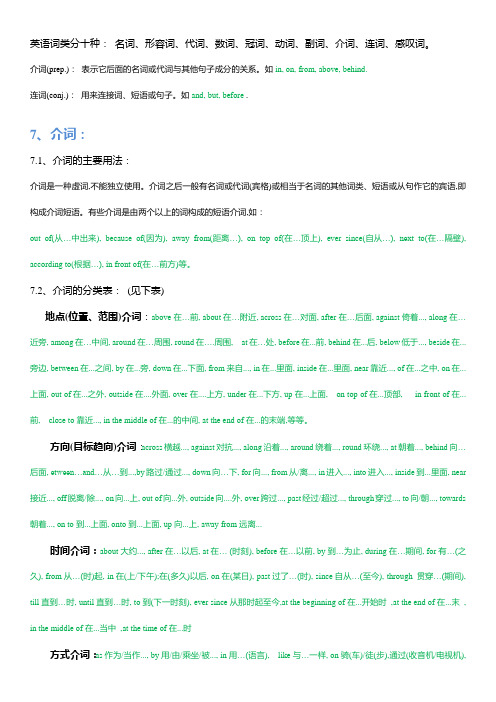
英语词类分十种:名词、形容词、代词、数词、冠词、动词、副词、介词、连词、感叹词。
介词(prep.):表示它后面的名词或代词与其他句子成分的关系。
如in, on, from, above, behind.连词(conj.):用来连接词、短语或句子。
如and, but, before .7、介词:7.1、介词的主要用法:介词是一种虚词,不能独立使用。
介词之后一般有名词或代词(宾格)或相当于名词的其他词类、短语或从句作它的宾语,即构成介词短语。
有些介词是由两个以上的词构成的短语介词,如:out of(从…中出来), because of(因为), away from(距离…), on top of(在…顶上), ever since(自从…), next to(在…隔壁), according to(根据…), in front of(在…前方)等。
7.2、介词的分类表:(见下表)地点(位置、范围)介词:above在…前, about在…附近, across在…对面, after在…后面, against倚着..., along在…近旁, among在…中间, around在…周围, round在….周围, at在…处, before在...前, behind在...后, below低于..., beside在...旁边, between在...之间, by在...旁, down在...下面, from来自..., in在...里面, inside在...里面, near靠近..., of在...之中, on在...上面, out of在...之外, outside在....外面, over在....上方, under在...下方, up在...上面, on top of在...顶部, in front of在...前, close to靠近..., in the middle of在...的中间, at the end of在...的末端,等等。
英语中介词讲解(常用的介词和介词短语)
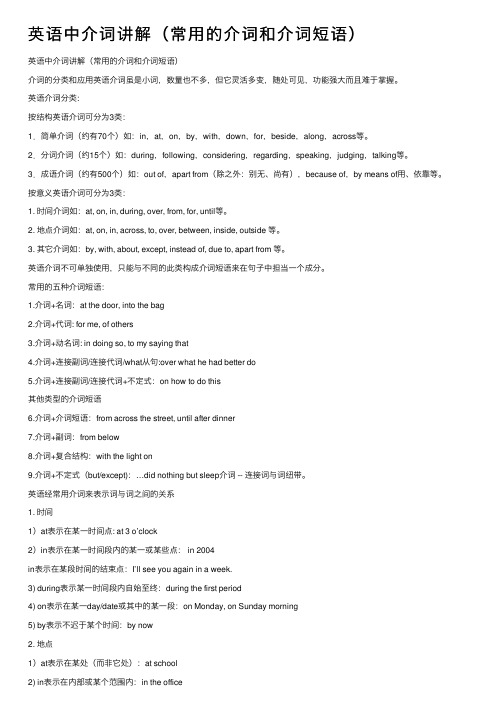
英语中介词讲解(常⽤的介词和介词短语)英语中介词讲解(常⽤的介词和介词短语)介词的分类和应⽤英语介词虽是⼩词,数量也不多,但它灵活多变,随处可见,功能强⼤⽽且难于掌握。
英语介词分类:按结构英语介词可分为3类:1.简单介词(约有70个)如:in,at,on,by,with,down,for,beside,along,across等。
2.分词介词(约15个)如:during,following,considering,regarding,speaking,judging,talking等。
3.成语介词(约有500个)如:out of,apart from(除之外:别⽆、尚有),because of,by means of⽤、依靠等。
按意义英语介词可分为3类:1. 时间介词如:at, on, in, during, over, from, for, until等。
2. 地点介词如:at, on, in, across, to, over, between, inside, outside 等。
3. 其它介词如:by, with, about, except, instead of, due to, apart from 等。
英语介词不可单独使⽤,只能与不同的此类构成介词短语来在句⼦中担当⼀个成分。
常⽤的五种介词短语:1.介词+名词:at the door, into the bag2.介词+代词: for me, of others3.介词+动名词: in doing so, to my saying that4.介词+连接副词/连接代词/what从句:over what he had better do5.介词+连接副词/连接代词+不定式:on how to do this其他类型的介词短语6.介词+介词短语:from across the street, until after dinner7.介词+副词:from below8.介词+复合结构:with the light on9.介词+不定式(but/except):…did nothing but sleep介词 -- 连接词与词纽带。
英语之中名词、代词、动词、形容词、冠词、数词、副词、介词、连词、感叹词
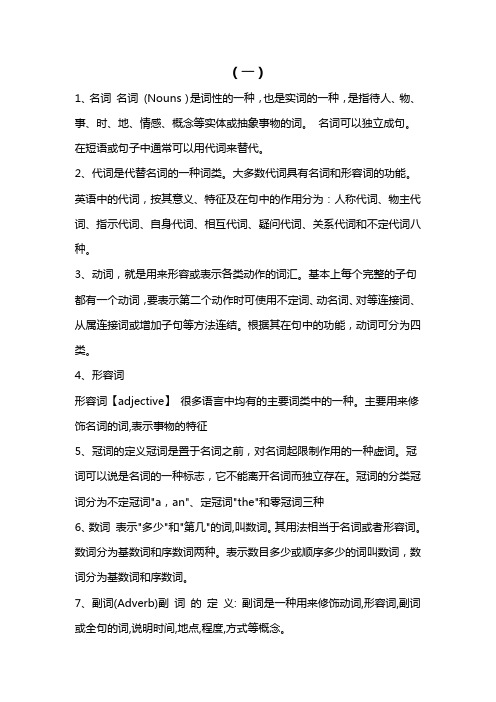
(一)1、名词名词(Nouns)是词性的一种,也是实词的一种,是指待人、物、事、时、地、情感、概念等实体或抽象事物的词。
名词可以独立成句。
在短语或句子中通常可以用代词来替代。
2、代词是代替名词的一种词类。
大多数代词具有名词和形容词的功能。
英语中的代词,按其意义、特征及在句中的作用分为:人称代词、物主代词、指示代词、自身代词、相互代词、疑问代词、关系代词和不定代词八种。
3、动词,就是用来形容或表示各类动作的词汇。
基本上每个完整的子句都有一个动词,要表示第二个动作时可使用不定词、动名词、对等连接词、从属连接词或增加子句等方法连结。
根据其在句中的功能,动词可分为四类。
4、形容词形容词【adjective】很多语言中均有的主要词类中的一种。
主要用来修饰名词的词,表示事物的特征5、冠词的定义冠词是置于名词之前,对名词起限制作用的一种虚词。
冠词可以说是名词的一种标志,它不能离开名词而独立存在。
冠词的分类冠词分为不定冠词"a,an"、定冠词"the"和零冠词三种6、数词表示"多少"和"第几"的词,叫数词。
其用法相当于名词或者形容词。
数词分为基数词和序数词两种。
表示数目多少或顺序多少的词叫数词,数词分为基数词和序数词。
7、副词(Adverb)副词的定义: 副词是一种用来修饰动词,形容词,副词或全句的词,说明时间,地点,程度,方式等概念。
8、介词的定义和特征介词是一种用来表示词与词, 词与句之间的关系的词。
在句中不能单独作句字成分。
介词后面一般有名词代词或相当于名词的其他词类,短语或从句作它的宾语。
(二)1、名词,人或事物的名称3、代词,代替名词或者数词(比如some就是代替数目)3、动词,动作或状态4、数词,表示数目或顺序(比如序数词,5th就是表示顺序)5、形容词,人或事物的性质或状态(因为形容词一般修饰名词)6、副词,动作的特征或性状特征(因为副词一般修饰动词或形容词)7、冠词,表示名词的泛指或特指8、介词,表示名词或代词与其他词的关系(因为介词后面一半紧跟名词,代词或其他名词性结构)9、连词,连接词与词,短语与短语,句子与句子10、感叹词,表示说话时的感情或语气(三)1、adj. / a. 形容词用来描述一类物质的性质,状态,外貌,或人的性格特点,性质,品格如:big,happy2、adv. / ad. 副词用来修饰动作或形容词,一般在句子中做状语用表示动作的进行怎样,或表示程度,特点,如:clearly,happily3、prep. 介词连接地点,时间的一类词语,可以表示方位,时间.跟一些表示时间,地点的词连用表示介词词组如:in,to,on,under4、conj. 连词用来连接时间,地点,原因,结果的一类词语如:when,beacuse,so5、num. 数词表示数字的词,既可以是基数词,也可以是序数词如:one,two,first6、int. 感叹词表示感叹的一类词,一般不加一解释,只代表感叹如:what,how,haurray7、vt. 及物动词(后面要加宾语)行为动作的词如:do,finish,play8、vi. 不及物动词(后面不加宾语)表示行为动作的词如:appear9、n. 名词表示物体,物质的词如:pig,cow,man10、pron. 代词代指一类人,事或物的词如:he,she,hers,his,things11、art = 冠词,article的缩写(四)在英语语法中主要把词分为8大类:1.名词:表示人、物或地方等,如:John,teacher;table,pen;London;beauty.2.代词:用来代替名词,以避免重复某个名词,如:I,you,it,that,those,them.3.形容词:用来修饰或限制某个(些)名词,如:good(man),white (paper),every(book),much(water),(John is)hon-est,(He seems)lazy.被修饰或限制的名词,叫做主体词(head-word)。
介词代词知识点总结

介词代词知识点总结介词代词是英语语法中的两个重要概念,它们在句子中起着不同的作用。
介词和代词都是英语中常见的词类,它们有各自的特点和用法。
介词用来连接名词、代词或动词短语,起连接作用;而代词可以代替名词或名词短语,起替代作用。
介词和代词是英语句子结构中不可或缺的成分,因此对它们的理解和正确应用十分重要。
1. 介词的概念和用法介词是连接名词、代词或动词短语的一种虚词,用来表示名词或代词和其他部分之间的关系。
在句子中,介词通常位于名词或代词之后,并与其构成介词短语。
介词的基本作用是表示时间、地点、方向、原因、目的等关系,从而让句子表达更加明确和具体的信息。
例如:in the morning(在早晨)、on the table(在桌子上)、to the park(去公园)等。
介词的种类主要包括时间介词、地点介词和方式介词等。
时间介词用来表示时间的长度、顺序、频率等,如at, on, in等;地点介词用来表示地点、方向、位置等,如in, on, at, under, over等;方式介词用来表示方式、原因、目的等,如by, with, for, from等。
介词在句子中的使用需要根据具体的情境和语境来确定,因此在学习和运用过程中需要多加练习和熟悉。
2. 代词的概念和分类代词是用来代替名词或名词短语的一种词类,它可以用来避免重复,让句子简洁明了。
代词主要分为人称代词、物主代词、指示代词、不定代词、疑问代词和相互代词等多种类型。
在句子中,代词通常可以作为主语、宾语、表语、定语等,起着不同的语法作用。
人称代词主要用来表示人或事物的三种人称关系,包括第一人称(I, we)、第二人称(you)、第三人称(he, she, it, they)等;物主代词用来表示所有关系或所属关系,包括形容词性物主代词、名词性物主代词和反身代词等;指示代词用来表示离说话者或听话者近或远的事物,包括this, that, these, those等。
高考英语 代词、介词和介词短语词(解析版)

代词、介词和介词短语考点01 代词1.(2024年浙江卷1月·语法填空)Who knows, perhaps some of the more forward-looking ________ (one) may yet come out with a whole range of “just for you” pack sizes with special offers as well.【答案】ones【解析】考查代词。
句意:谁知道呢,也许一些更有远见的人可能还会推出一系列“只为你”的包装尺寸,并提供特别优惠。
代词one意为“一个人”,在some of后应用复数形式。
故填ones。
preserved for all people of the nation to enjoy-as a national park.【答案】its【解析】考查代词。
句意:这个地方,以其独特而令人惊叹的自然美景,必须被妥善保存供全国人民欣赏。
这里“它们”用形容词性物主代词做定语修饰名词beauty。
3.(2023年全国甲卷改错)In that class, Miss Zhao, our biology teacher, showed we insects on stamps.【答案】we→us【解析】考查代词。
句意:在那节课上,我们的生物老师赵老师给我们看了邮票上的昆虫。
作动词show的宾语,应用宾格us。
故we改为us。
4.(2023年全国乙卷改错)Last Friday my mom decided to color his hair. She studied with all the hair products at the drugstore.【答案】his → her【解析】考查代词。
句意:上周五,我妈妈决定染头发。
此处指“我妈妈染她的头发”,应用代词her。
故his 改为her。
5.(2022年北京卷语法填空)Since people can’t always eat out or cook for ________ (they), they get takeout or order delivery.【答案】themselves【解析】考查反身代词。
英语之中名词、代词、动词、形容词、冠词、数词、副词、介词、连词、感叹词
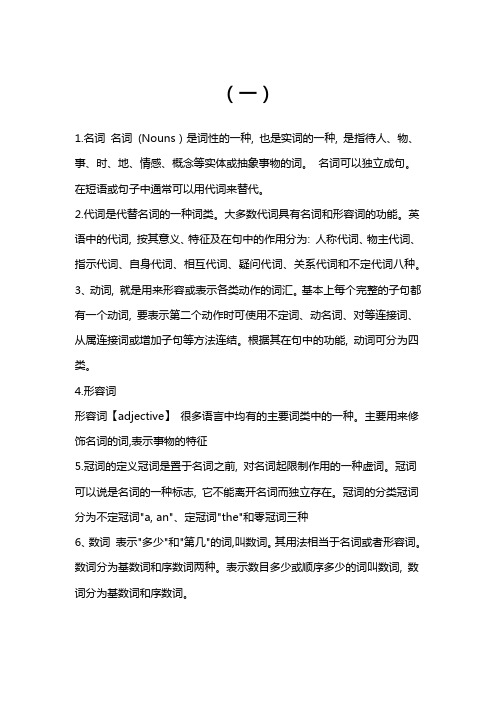
(一)1.名词名词(Nouns)是词性的一种, 也是实词的一种, 是指待人、物、事、时、地、情感、概念等实体或抽象事物的词。
名词可以独立成句。
在短语或句子中通常可以用代词来替代。
2.代词是代替名词的一种词类。
大多数代词具有名词和形容词的功能。
英语中的代词, 按其意义、特征及在句中的作用分为: 人称代词、物主代词、指示代词、自身代词、相互代词、疑问代词、关系代词和不定代词八种。
3、动词, 就是用来形容或表示各类动作的词汇。
基本上每个完整的子句都有一个动词, 要表示第二个动作时可使用不定词、动名词、对等连接词、从属连接词或增加子句等方法连结。
根据其在句中的功能, 动词可分为四类。
4.形容词形容词【adjective】很多语言中均有的主要词类中的一种。
主要用来修饰名词的词,表示事物的特征5.冠词的定义冠词是置于名词之前, 对名词起限制作用的一种虚词。
冠词可以说是名词的一种标志, 它不能离开名词而独立存在。
冠词的分类冠词分为不定冠词"a, an"、定冠词"the"和零冠词三种6、数词表示"多少"和"第几"的词,叫数词。
其用法相当于名词或者形容词。
数词分为基数词和序数词两种。
表示数目多少或顺序多少的词叫数词, 数词分为基数词和序数词。
7、副词(Adverb)副词的定义: 副词是一种用来修饰动词,形容词,副词或全句的词,说明时间,地点,程度,方式等概念。
8、介词的定义和特征介词是一种用来表示词与词, 词与句之间的关系的词。
在句中不能单独作句字成分。
介词后面一般有名词代词或相当于名词的其他词类, 短语或从句作它的宾语。
(二)1.名词, 人或事物的名称3.代词, 代替名词或者数词(比如some就是代替数目)3.动词, 动作或状态4.数词, 表示数目或顺序(比如序数词, 5th就是表示顺序)5.形容词, 人或事物的性质或状态(因为形容词一般修饰名词)6.副词, 动作的特征或性状特征(因为副词一般修饰动词或形容词)7、冠词, 表示名词的泛指或特指8、介词, 表示名词或代词与其他词的关系(因为介词后面一半紧跟名词, 代词或其他名词性结构)9、连词, 连接词与词, 短语与短语, 句子与句子10、感叹词, 表示说话时的感情或语气(三)1.adj./ a.形容词用来描述一类物质的性质,状态,外貌,或人的性格特点,性质,品格如:big,happy2.adv./ ad.副词用来修饰动作或形容词,一般在句子中做状语用表示动作的进行怎样,或表示程度,特点,如:clearly,happily3.prep.介词连接地点,时间的一类词语,可以表示方位,时间.跟一些表示时间,地点的词连用表示介词词组如:in,to,on,under4.conj.连词用来连接时间,地点,原因,结果的一类词语如:when,beacuse,so5.num.数词表示数字的词,既可以是基数词,也可以是序数词如:one,two,first6.int.感叹词表示感叹的一类词,一般不加一解释,只代表感叹如:what,how,haurray7、vt.及物动词(后面要加宾语)行为动作的词如:do,finish,play8、vi.不及物动词(后面不加宾语)表示行为动作的词如:appear9、n.名词表示物体,物质的词如:pig,cow,man10、pron.代词代指一类人,事或物的词如:he,she,hers,his,things11.art = 冠词, article的缩写(四)在英语语法中主要把词分为8大类:1. 名词: 表示人、物或地方等, 如: John, teacher;table, pen;London;beauty.2. 代词: 用来代替名词, 以避免重复某个名词, 如: I, you, it, that, those, them.3.形容词:用来修饰或限制某个(些)名词, 如:good(man), white (paper), every(book), much(water), (John is)hon-est, (He seems)lazy.被修饰或限制的名词, 叫做主体词(head-word)。
英语语法之代词介词
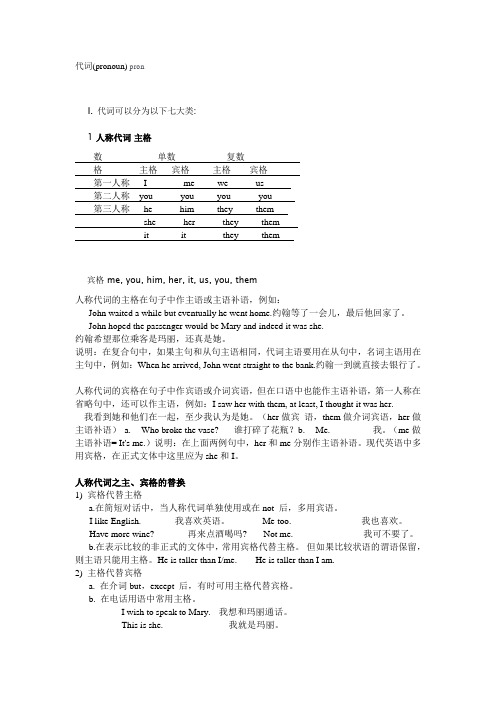
代词(pronoun) pronI. 代词可以分为以下七大类:1 人称代词主格数单数复数格主格宾格主格宾格第一人称I me we us第二人称you you you you第三人称he him they themshe her they themit it they them宾格 me, you, him, her, it, us, you, them人称代词的主格在句子中作主语或主语补语,例如:John waited a while but eventually he went home.约翰等了一会儿,最后他回家了。
John hoped the passenger would be Mary and indeed it was she.约翰希望那位乘客是玛丽,还真是她。
说明:在复合句中,如果主句和从句主语相同,代词主语要用在从句中,名词主语用在主句中,例如:When he arrived, John went straight to the bank.约翰一到就直接去银行了。
人称代词的宾格在句子中作宾语或介词宾语,但在口语中也能作主语补语,第一人称在省略句中,还可以作主语,例如:I saw her with them, at least, I thought it was her.我看到她和他们在一起,至少我认为是她。
(her做宾语,them做介词宾语,her做主语补语)a. -- Who broke the vase?--谁打碎了花瓶?b. -- Me.--我。
(me做主语补语= It's me.)说明:在上面两例句中,her和me分别作主语补语。
现代英语中多用宾格,在正式文体中这里应为she和I。
人称代词之主、宾格的替换1) 宾格代替主格a.在简短对话中,当人称代词单独使用或在not 后,多用宾语。
---- I like English.--我喜欢英语。
---- Me too.--我也喜欢。
英语中常用的介词
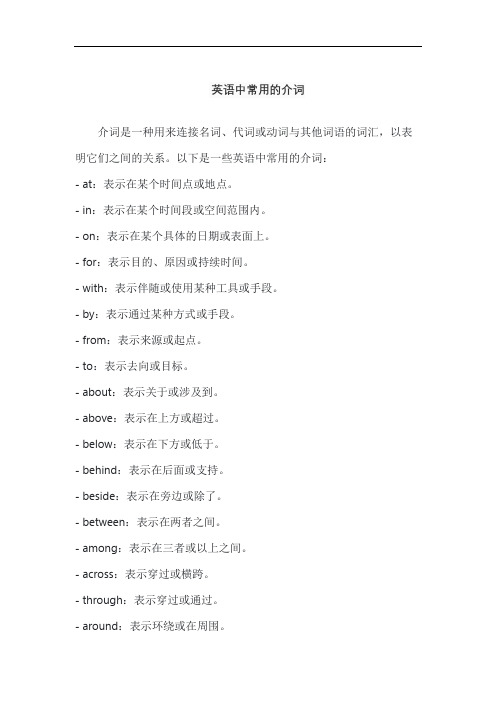
英语中常用的介词
介词是一种用来连接名词、代词或动词与其他词语的词汇,以表明它们之间的关系。
以下是一些英语中常用的介词:
- at:表示在某个时间点或地点。
- in:表示在某个时间段或空间范围内。
- on:表示在某个具体的日期或表面上。
- for:表示目的、原因或持续时间。
- with:表示伴随或使用某种工具或手段。
- by:表示通过某种方式或手段。
- from:表示来源或起点。
- to:表示去向或目标。
- about:表示关于或涉及到。
- above:表示在上方或超过。
- below:表示在下方或低于。
- behind:表示在后面或支持。
- beside:表示在旁边或除了。
- between:表示在两者之间。
- among:表示在三者或以上之间。
- across:表示穿过或横跨。
- through:表示穿过或通过。
- around:表示环绕或在周围。
- inside:表示在内部或里面。
- outside:表示在外部或外面。
- near:表示在附近或接近。
- far:表示在远处或远离。
英语介词讲解

英语介词讲解介词(preposition)是一种用来连接名词、代词或名词短语与其他词或短语的词类,在句子中常常表示位置、方向、时间、关系等。
以下是一些常见的英语介词及其用法:1.in:表示在某个位置、地点、范围或状态之内。
例如:in the room(在房间里)、in London(在伦敦)、in the book(在书中)等。
2.on:表示在某个平面、表面、方向或日期上。
例如:on the table(在桌子上)、on the wall(在墙上)、on Monday(在星期一)等。
3.at:表示在某个点、时间、活动或事件上。
例如:at the park(在公园)、at 8 o'clock(在8点)、at the party(在聚会上)等。
4.by:表示通过某种方式、手段或时间。
例如:by car(乘车)、by email (通过电子邮件)、by Friday(到星期五)等。
5.for:表示为某个目的、目标或时间段。
例如:for you(为你)、for two hours(两个小时)、for breakfast(作为早餐)等。
6.to:表示朝向某个地点、目的地或对象。
例如:to the park(到公园)、to the store(到商店)、to you(给你)等。
7.from:表示起点、来源或运动方向。
例如:from the house(从房子里)、from London(从伦敦)、from Monday to Friday(从星期一到星期五)等。
8.with:表示伴随、附带或使用某物。
例如:with my friend(和我的朋友一起)、with a pen(用一支笔)、with pleasure(乐意)等。
9.about:表示关于某个主题、话题或方面。
例如:about the book(关于这本书)、about the weather(关于天气)、talk about(谈论)等。
10.of:表示属于、关于或由某物组成。
代词介词

中考考点:代词一、代词的分类英语中常把代词分为人称代词、物主代词、反身代词、指示代词、疑问代词、连接代词、不定代词和相互代词。
二、代词的用法1.人称代词:注意:1人称代词we, you, they 可以用来表示一般人。
例如:You cannot go into the hall with slippers. 不准穿拖鞋进入大厅。
2人称代词she可以用指代祖国、大地、月亮、轮船等。
例如:The ship is leaving. She's on her first trip to Boston. 轮船要起航了。
这时她第一次去波士顿。
We love our country, we hope she'll be stronger and stronger. 我们热爱我们的祖国,我们希望她越来越强大。
3.It作为人称代词时,可以表示天气、距离、时间、环境等。
例如:It is about 10 kilometres from here. 离这儿大约有10公里。
4It 还可用作形式主语或形式宾语,来代替由不定式,动词的-ing,形式或主语从句构成的真正的主语或宾语,以避免句子头重脚轻。
例如:It is not easy to learn English well.It is good for you taking a walk after supper.I found it difficult to sleep.5人称代词的排列顺,I 在最后,you 在最前;但是,当受到批评或时承认错误时正好相反,I 在最前,you在最后。
例如:You, he and I are all the winners.I, Li lei and you are wrong. We should do more for the project.2.物主代词:注:名词性物主代词可以与of 连用,作定语。
例如:A friend of ours are waiting for us.3.反身带词:用来表示"某人自己"的代词称为反身代词。
介词英语用法
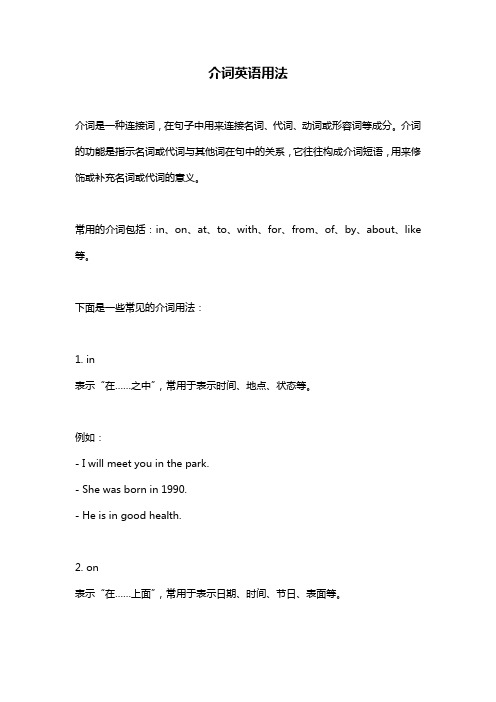
介词英语用法介词是一种连接词,在句子中用来连接名词、代词、动词或形容词等成分。
介词的功能是指示名词或代词与其他词在句中的关系,它往往构成介词短语,用来修饰或补充名词或代词的意义。
常用的介词包括:in、on、at、to、with、for、from、of、by、about、like 等。
下面是一些常见的介词用法:1. in表示“在……之中”,常用于表示时间、地点、状态等。
例如:- I will meet you in the park.- She was born in 1990.- He is in good health.2. on表示“在……上面”,常用于表示日期、时间、节日、表面等。
例如:- The book is on the table.- We will have a party on Christmas Day.- I usually go to bed on time.3. at表示“在……的地点、时间或情况”,常用于表示时间、地点、活动等。
例如:- We will meet at the station at 7 o'clock.- He is good at playing basketball.- I am at home now.4. to表示“到达”,常用于表示动作的方向。
例如:- I am going to the store.- He went to the park to play basketball.- She is walking to the school.5. with表示“带有……”,常用于表示伴随、附带等。
例如:- I went to the movies with my friends.- She is wearing a dress with flowers on it.- He plays the guitar with great skill.6. for表示“为了……”,常用于表示目的、原因、价值等。
新概念英语语法:代词和介词分类汇总表

图说英语:代词与介词分类表序号数人称单数复数一二三一二三1 人称代词主格I you he she it we you they 宾格me you him her it us you them2 物主代词形容词性my your his her its our your their名词性mine yours his hers its ours yours theirs3 反身代词myself yourself himself herself itself ourselves yourselves themselves4 指示代词this ,that these ,those5 不定代词指代人somebody, someone, anybody, anyone, nobody, noone, everybody, everyone事物something, anything, nothing, everything指代人或物事one, another, each, every, much, either, neither, little,a littleones, others, the others, both, few,a few, many, severalsome, any, no, all, other, the other, none, a lot(of), such6 相互代词each other, one another, each other’s,one another’s7 疑问代词who(ever), whom(ever), whose(ever), which(ever), what(ever)8 关系代词who, whom, whose, which, that, as1.介词的分类表分类例词按形简单介词at, about, above, after, as, but, by, down, during, except, for, from, in, like, near, off,of, on, opposite, over, past, round, since, through, till, to, under, until, up, besides,between, beyond, with, across, against, along, among, around, before, behind, below,beside复合介词inside, outside, onto, into, toward(s), upon, within, without式分短语介词along with, together with, according to, ahead of, as for, as to, because of, due to,except for, owing to, out of, up to, by means of, by the side of, by way of, in front of,in spite of, as far as特殊介词concluding, regarding, considering, saving, save=except双重介词until after, until before, Saturday, except, on duty按功能分空间(地方、位置、方向、范围、界限、包括、排除)about, above, across, after, against, along, among, (a)round, at, before, behind, with,below, beneath, beside, besides, between, upon, save, beyond, but, by, concerning,down, on, out of, outside, over, past, through, throughout, towards, under, up 时间after, before, as, between, by, during, for, from, in, on, over, past, till, until, up to,within, through, throughout原因,理由,根源(目的,内容等)about, according to, as, because of,due to,owing to,on acount of, from, of, on, with,regarding, concerning, considering, through, by, under, for2.容易混淆的介词区别讲解例句表示时间的介词at, on, inat表示“在几点几分”(单位最小);on表示“在具体的某一天或某天上午(下午晚上等)”;in表示“在几天、周、月、年”。
英语中介词的意思及用法

英语中介词的意思及用法英语中介词是冠词、代词、数词、动词等做状语、定语、表语等作用时,连接他们的词语。
在英语中,介词绝大多数都有主语和宾语,表示主语和宾语之间的一种关系。
英语中介词分为常用介词和少用介词。
一、常用介词常用介词有in, on, at, from, to, with, for, of, in front of, behind, under, over, above, below, along, between, among, before, after, through, across, during, beside, by等。
1、inin表示“在...之内”的意思,表示物体的物理位置,或者表示状态,或者表示某一段时间之内。
例如:The book is in the classroom. 书在教室里。
She was in the hospital last week.上星期在医院里。
2、onon表示“在...上面”的意思,一般表示物体的物理位置,或者某处正在进行的活动。
例如:The book is on the table. 书在桌子上。
They are having a meeting on the fourth floor. 他们正在四楼开会。
3、atat表示“在...旁边”的意思,表示物体的物理位置。
例如:The girl is at the window.孩在窗户旁边。
4、fromfrom表示“从...起”的意思,表示某处的起始点。
例如:She comes from China.来自中国。
5、toto表示“至...终点”的意思,表示某处的终点。
例如:He is going to the station. 他正去车站。
6、withwith表示“和...一起”的意思,一般表示一起行动或一起出现的情况,也可以表示和某人有某种特定的关系。
例如:The children are playing with their teacher.子们和老师一起玩。
初中英语代词

1、词类:英语词类分十种:名词、形容词、代词、数词、冠词、动词、副词、介词、连词、感叹词。
1、名词(n.):表示人、事物、地点或抽象概念的名称。
如:boy, morning, bag, ball, class, orange.2、代词(pron.):主要用来代替名词。
如:who, she, you, it .3、形容词(adj..):表示人或事物的性质或特征。
如:good, right, white, orange .4、数词(num.):表示数目或事物的顺序。
如:one, two, three, first, second, third, fourth.5、动词(v.):表示动作或状态。
如:am, is,are,have,see .6、副词(adv.):修饰动词、形容词或其他副词,说明时间、地点、程度等。
如:now, very, here, often, quietly, slowly.7、冠词(art..):用在名词前,帮助说明名词。
如:a, an, the.8、介词(prep.):表示它后面的名词或代词与其他句子成分的关系。
如in, on, from, above, behind.9、连词(conj.):用来连接词、短语或句子。
如and, but, before .10、感叹词(interj..)表示喜、怒、哀、乐等感情。
如:oh, well, hi, hello.2、构词法:英语构词法主要有:合成法、派生法和转换法。
1、合成法:如:spaceship, headache, basketball, playground等等。
2、派生法:(1)派生名词:①动词+er/or②动词+ing③动词+(t)ion④形容词+ness⑤其他,如:inventor, learner, swimming, congratulation, kindness,carelessness, knowledge(2)派生形容词:①名词+y②名词+ful③动词+ing/ed④friendly⑤dangerous⑥Chinese; Japanese⑦English⑧French⑨German⑩国名+(i)an如:snowy, sunny, hopeful, beautiful, interesting, follwing,daily(每日的),nervous, delicious(3)派生副词:①形容词+ly ②其它,如:slowly, angrily, full→fully, good→well, possible→possibly等等。
英语之中名词、代词、动词、形容词、冠词、数词、副词、介词、连词、感叹词

英语之中名词、代词、动词、形容词、冠词、数词、副词、介词、连词、感叹词副词用来修饰动词、形容词或其他副词,表示时间、地点、方式、程度等概念。
如: slowly。
here3、___名词表示人、物、地点、时间、情感、概念等实体或抽象事物的词汇。
可独立成句,通常可以用代词替代。
如: book。
love4、___代词代替名词或数词的一种词类,具有名词和形容词的功能。
包括人称代词、物主代词、指示代词、自身代词、相互代词、疑问代词、关系代词和不定代词。
如: he。
their。
this5、v。
/ verb动词用来表示动作或状态的词汇,每个完整的子句都要有一个动词。
可使用不定词、动名词、对等连接词、从属连接词或增加子句等方法连结。
如: run。
think6、___数词表示数目或顺序的词汇,可用作名词或形容词。
分为基数词和序数词两种。
如: three。
fifth7、art。
/ article冠词置于名词前起限制作用的一种虚词,分为不定冠词"a,an"、定冠词"the"和零冠词。
如: a book。
the sky8、___介词用来表示词与词、词与句之间的关系的词汇,不能单独作句子成分。
后面一般有名词代词或相当于名词的其他词类、短语或从句作宾语。
如: in。
with9、___连词用来连接词与词、短语与短语、句子与句子的词汇。
如: and。
but10、int。
/ n感叹词表示说话时的感情或语气的词汇。
如: wow。
oh___ for you。
He is upset with Mary。
Adverbs modify or limit verbs。
adjectives。
other adverbs。
and even ns。
ns。
___ the task with great care。
He is an ___ kind individual。
John is ___ at seven o'clock。
英语代词的用法全归纳
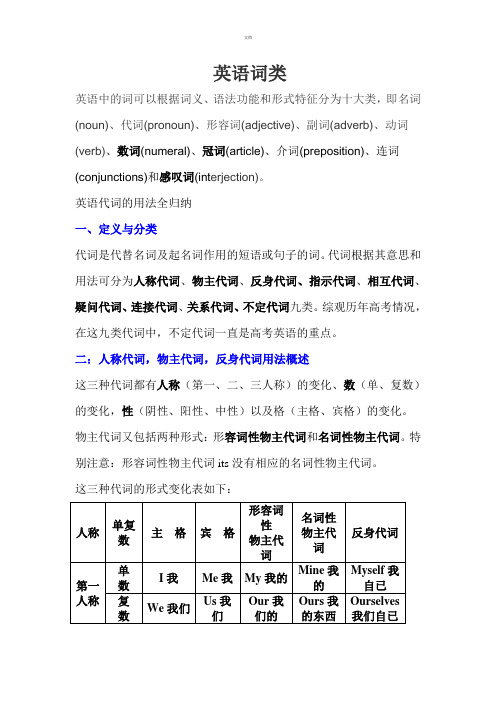
英语词类英语中的词可以根据词义、语法功能和形式特征分为十大类,即名词(noun)、代词(pronoun)、形容词(adjective)、副词(adverb)、动词(verb)、数词(numeral)、冠词(article)、介词(preposition)、连词(conjunctions)和感叹词(int erjection)。
英语代词的用法全归纳一、定义与分类代词是代替名词及起名词作用的短语或句子的词。
代词根据其意思和用法可分为人称代词、物主代词、反身代词、指示代词、相互代词、疑问代词、连接代词、关系代词、不定代词九类。
综观历年高考情况,在这九类代词中,不定代词一直是高考英语的重点。
二:人称代词,物主代词,反身代词用法概述这三种代词都有人称(第一、二、三人称)的变化、数(单、复数)的变化,性(阴性、阳性、中性)以及格(主格、宾格)的变化。
物主代词又包括两种形式:形容词性物主代词和名词性物主代词。
特别注意:形容词性物主代词its没有相应的名词性物主代词。
这三种代词的形式变化表如下:三、人称代词的用法1) 定义:人称代词是用来指代人、动物或事物的代词。
它必须在人称(第一人称、第二人称、及第三人称)、数(单数、复数)以及性(阴性、阳性、中性)三方面与被指代的名词一致。
如:I am a student. Tom is a boy, and he is a student.Mary is very pretty, and she likes singing.The boys are students, and they are in the room.The doy is small. It is Tom's.2)人称代词的句法功能A) 人称代词有主格和宾语之分:主格用作主语,宾格用作宾语。
B) 人称代词的主格形式在在句中作主语和表语。
如: I like music(主语). She is a teacher.(主语)She and I are good friends(主语).Neither she nor I am student.——I saw the boys this morning.——Are you sure it was they(表语)?C) 人称代词的宾格在句子作动词的宾语,或者介词的宾语。
初中英语介词知识点:五种介词短语

初中英语介词知识点:五种介词短语
英语介词不可单独使用,只能与不同的此类构成介词短语来在句子中担当一个成分。
常用的五种介词短语
1.介词+名词:at the door, into the bag
2.介词+代词: for me, of others
3.介词+动名词: in doing so, to my saying that
4.介词+连接副词/连接代词/what从句:over what he had better do
5.介词+连接副词/连接代词+不定式:on how to do this
其他类型的介词短语
6.介词+介词短语:from across the street, until after dinner
7.介词+副词:from below
8.介词+复合结构:with the light on
9.介词+不定式(but/except):
did nothing but sleep介词-- 连接词与词纽带
英语经常用介词来表示词与词之间的关系。
介词的解释英语知识
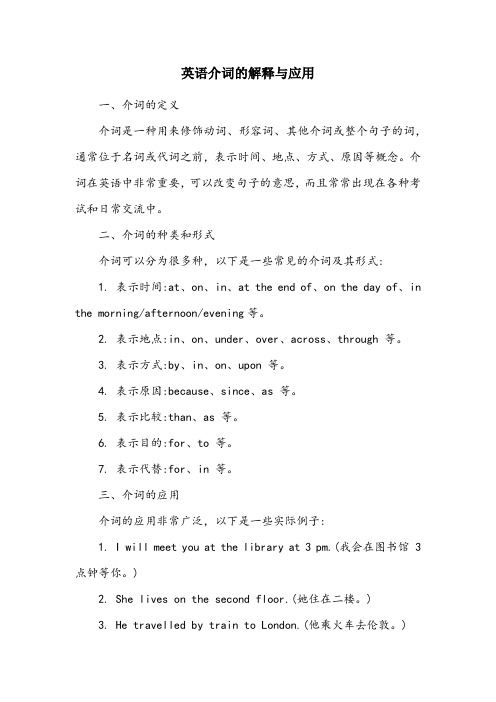
英语介词的解释与应用一、介词的定义介词是一种用来修饰动词、形容词、其他介词或整个句子的词,通常位于名词或代词之前,表示时间、地点、方式、原因等概念。
介词在英语中非常重要,可以改变句子的意思,而且常常出现在各种考试和日常交流中。
二、介词的种类和形式介词可以分为很多种,以下是一些常见的介词及其形式:1. 表示时间:at、on、in、at the end of、on the day of、in the morning/afternoon/evening等。
2. 表示地点:in、on、under、over、across、through 等。
3. 表示方式:by、in、on、upon 等。
4. 表示原因:because、since、as 等。
5. 表示比较:than、as 等。
6. 表示目的:for、to 等。
7. 表示代替:for、in 等。
三、介词的应用介词的应用非常广泛,以下是一些实际例子:1. I will meet you at the library at 3 pm.(我会在图书馆 3 点钟等你。
)2. She lives on the second floor.(她住在二楼。
)3. He travelled by train to London.(他乘火车去伦敦。
)4. Since you are tired, we will take a break.(因为你累了,我们会休息一下。
)5. The book is more interesting than the movie.(这本书比电影更有趣。
)6. She studied for two hours before going to bed.(她在睡觉前学习了两个小时。
)7. He paid for the dinner with his credit card.(他用信用卡付了晚餐的钱。
)以上就是英语中介词的解释和应用。
介词虽然看似简单,但用法却非常灵活,需要多加练习才能熟练掌握。
- 1、下载文档前请自行甄别文档内容的完整性,平台不提供额外的编辑、内容补充、找答案等附加服务。
- 2、"仅部分预览"的文档,不可在线预览部分如存在完整性等问题,可反馈申请退款(可完整预览的文档不适用该条件!)。
- 3、如文档侵犯您的权益,请联系客服反馈,我们会尽快为您处理(人工客服工作时间:9:00-18:30)。
介词高考真题练习(全国卷)Let’s learn to use the problem we are facing ______ a stepp ing-stone to future success. A. to B. for C. as D. by(安徽卷)Fred entered without knocking and, very out of breath, sank _______ a chair. A. on B. off C. into D. to(福建卷)A great man shows his greatness _____ the way he treats little man.A. underB. withC. onD. by(福建卷)You have no idea how she finished the relay race ____ her foot wounded so much。
A. for B. when C. with D. while(湖南卷)— When did you last hear ______ Jay?— He phoned me this morning, and we agreed ______ a time and place to meet. A. of, to B. about, with C. from, with D. from, on(全国II) Modern equipment and no smoking are two of the things I like ____ working here. A. with B. over C. at D. about(陕西卷)Elizabeth has already achieved success _________ her wildest dreams.A. atB. beyondC. withinD. upon(北京卷)If you really have to leave during the meeting, you’d b etter leave ____ the back door. A. for B. by C. across D. out家庭作业:10年高考真题练习1.(上海春季The speech by the mayor of Shanghai before the final voting for EXPO 2010 is strongly impressed _______ my memory.A.toB.overC.byD.on2.(NMET北京) — What do you want _______ those old boxes— To put things in when I move to the new flat.A.byB.forC.ofD.with3.(北京春季) — You are so lucky.— What do you mean _______ thatA.forB.inC.ofD.by4.(上海) Luckily, the bullet narrowly missed the captain _______ an inch.A.byB.atC.toD.from5.(上海春季) Marie Curie took little notice the honours that were given to her in her later years.A.ofB.onC.aboutD.from6.(NMET ) The home improvements have taken what little there is _______ my spare time.A.fromB.inC.ofD.at7.(上海) The sunlight came in _______ the windows in the roof and lit up the whole room.A.throughB.acrossC.onD.over8.(上海春季) Rose was wild with joy _______ the result of the examination.A.toB.atC.byD.as9.(NMET ) I don't think I'll need any money but I'll bring some _______.A.at lastB.in caseC.once againD.in time10.(NMET) _______ production up by 60%, the company has had another excellentA.AsB.ForC.WithD.Through11.(NMET北京春季) John may phone tonight.I don't want to go out _______ he phone.A.as long asB.in order thatC.in caseD.so that12.(NMET广东省) Your performance in the driving test didn't reach the required standard —_______, you failed.A.in the endB.after allC.in other wordsD.at the same time13.(上海) The number of the employees has grown from 1 000 to 1 200.This means it has risen _______ 20 percent.A.byB.atC.toD.with14.(上海) I wanted two seats _______Madame Curie for Friday night, so I rang the cinema to see if I could book two tickets.A.ofB.aboutC.toD.for15.(NMET) The train leaves at 6:00 p.m.So I have to be at the station _____ 5:40 p.m.at the latest.A.untilB.afterC.byD.around16.(上海) For miles around me, there was nothing but a desert, without a single tree _______.A.in sightB.on earthC.at a distanceD.in place17.(上海) We're all going to the games, why don't you come _______A.upB.acrossC.alongD.to18.(上海) Come and see me _______ two or three _______.A.for; daysB.after; daysC.in; days' timeD.during; day time19.(NMET) Don't all speak at once! _______, please.A.Each at one timeB.One by one timeC.One for each timeD.One at a time代词高考真题练习(全国I卷)30. —Which of the two computer games did you prefer?—Actually I didn’t like ______.A. both of themB. either of themC. none of themD. neither of them (全国I卷)33. The English spoken in the United States is only slightly different from ______ spoken in England.A. whichB. whatC. thatD. the one(安徽卷)21. The two girls are getting on very well and share _______ with each other.A. littleB. muchC. some D none(福建卷)21. –How do you find your new classmates?– Most of them are kind, but ____ is so good to me as Bruce.A. noneB. no oneC. every oneD. some one(湖南卷)21. Our nerghbors gave _____ a baby bird yesterday that hurt ______ when it fell from its nest.A. us,itB. us,itselfC. ourselves, itselfD. ourselves, it(山东卷)27. Make sure you’ve got the passports and tickets and ______ before youA. somethingB. anythingC. everythingD. nothing(江西卷)23. Isn’t it amazing how the human body heals ____ after an injury?A. himselfB. himC. itselfD. it(辽宁卷)26. —Could you tell me how to get to Victoria Street?—Victoria Street? ______ is where the Grand Theatre is.A. SuchB. ThereC. ThatD. This(陕西卷)12. He doesn’t have _________ furniture in his room --just an old desk.A. anyB. manyC. someD. much(四川卷)11. The manager believes prices will not rise by more than _____ four percent.A. any otherB. the otherC. anotherD. other(浙江卷)9. –I’d like some more cheese.–Sorry, there’s ______ left.A. someB. noneC. a littleD. few(北京卷)25. It was hard for him to learn English in a family, in which _____ of the parents spoke the language.A. noneB. neitherC. bothD. each(天津卷)5. To know more about the British Museum, you can use the Internet to go to the library, or _______.A. neitherB. someC. allD. both(重庆卷)24.—Could we see each other at 3 o’clock this afternoon?---Sorry, let’s make it __ time.A. other’sB. the otherC. anotherD. other(上海卷)26. -- Do you want tea or coffee?-- ______, I really don't mind.A. noneB. neitherC. eitherD. all家庭作业:10年高考真题练习1.(北京春季) —The boys are not doing a good job at all, are they—_______.A.I guess not soB.I don't guessC.I don't guess soD.I guess not2.(上海春季) Equipped with modern facilities, today's libraries differ greatly from _______.A.those of the pastB.the pastC.which of the pastD.these past3.(NMET) The mother didn't know _______ to blame for the broken glass as it happened while she was out.A.whoB.whenC.howD.what4.(NMET ) Meeting my uncle after all these years was an unforgettable moment,_______ I will always treasure.A.thatB.oneC.itD.what5.(上海) There's a feeling in me _______ we'll never know what a UFO is —not ever.A.thatB.whichC.of whichD.what6.(NMET北京春季) — He was nearly drowned once.— When was _______— _______ was in 2008 when he was in middle school.A.that; ItB.this; ThisC.this; ItD.that; This7.(NMET北京春季) — You're always e on, let's go shopping.— _______ you ever want to do is going shopping.A.AnythingB.SomethingC.AllD.That8.(NMET) The Parkers bought a new house but _______ will need a lot of work before they can move in.A.theyB.itC.oneD.which9.(上海) Both teams were in hard training, _______ was willing to lose the game.A.eitherB.neitherC.anotherD.the other10.(北京春季) If this dictionary is not yours, _______ can it beA.what elseB.who elseC.which else'sD.who else's11.(上海春季) Some of the wheat is from Canada.What about _______A.anotherB.the otherC.othersD.the rest12.(NMET ) —Why don't we take a little break—Didn't we just have _______A.itB.thatC.oneD.this13.(NMET北京春季) —Do you want tea or coffee—_______.I really don't mind.A.BothB.NoneC.EitherD.Neither14.(北京春季) One of the sides of the board should be painted yellow, and _______.A.the other is whiteB.another whiteC.the other whiteD.another is white15.( NMET广东) Few pleasures can equal _______ of a cool drink on a hot day.A.someB.anyC.thatD.those16.(NMET ) Dr.Black comes from either Oxford or Cambridge, I can't remember _______.A.whereB.thereC.whichD.that17.(NMET ) I agree with most of what you said, but I don't agree with _______.A.everythingB.anythingC.somethingD.nothing18.(上海)_______ friends Betty had made there were all invited to her birthday party.A.Few ofB.FewC.The fewD.A few19.(上海) Some people would rather ride bikes as bike riding has _______ of the trouble of taking buses.A.nothingB.noneC.someD.neither20.(NMET) They were all very tired, but _______ of them would stop to take a rest.A.anyB.someC.noneD.neither21.(NMET) I hope there are enough glasses for each guest to have _______.A.itB.thoseC.themD.one。
